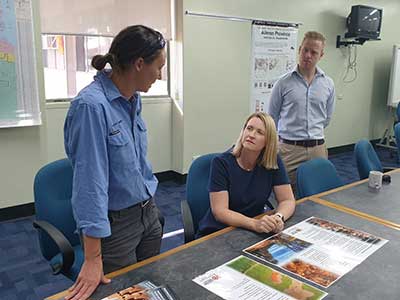Institute’s impressive research sparks interest
The Department of Industry, Tourism and Trade’s latest research efforts in Central Australia were on display during a recent visit from Minister Nicole Manison in early October.
From geological services, mine management, agricultural and horticultural research to biosecurity and disease eradication, and animal production research, the Arid Zone Research Institute (AZRI) in Alice Springs plays a vital role in ensuring the viability and sustainability of important Territory industries.
Overviews and research and program updates were provided by team members to the Minister for Agribusiness and Aquaculture, including on agribusiness development, and plant and livestock industries.
“The minister asked lots of pertinent questions, showed a lot of existing knowledge of each area and gave positive feedback and encouragement to the staff,” said Regional Director Agriculture - Southern, Angus Duguid.
He provided an overview of the department’s research stations and the work taking place at them, including collaborations between the department and commercial growers on new crop trials. This included the potential for future projects across the region.
Agribusiness Development Manager James Christian’s recent discussions around ways to improve freight in the region also sparked interest. As part of the 2021 Developing Northern Australia Conference, James presented his conversation starting ideas around freight efficiencies. A desktop review he carried out found there are substantial cost advantages of rail over road and he talked about various costs and benefits with the minister.
His study found if a new rail link is built from Tennant Creek to Queensland, additional savings would be obtained for accessing east coast markets. Rail trucks for cattle could be designed to facilitate back freight into the NT, including goods used in the cattle industry such as hay and feed supplements. The idea has already generated discussions among freight and cattle industry representatives in the region after an interview with ABC Rural.
AZRI is home to an accredited water microbiology laboratory, with lab manager, Cinzia Rovida, outlining the work done at AZRI around testing water supply and sewage samples to measure bacteria levels. The lab provides services to other government agencies, private enterprise and the community.
The institute is also the base for sentinel testing for arboviruses and avian viruses using chickens and cattle, with Principal Veterinary Officer, Dr Peter Saville, talking about the monthly collection of blood samples from the sentinel cattle herd. These samples are routinely test for viruses transmitted by flying, blood-sucking insects. This recently included blue tongue, a serious disease in sheep which can be carried in cattle.
In addition, AZRI has played an important role in national animal and crop disease eradication programs, with recent work on the detection and management of diseases in honey bees in the region highlighted during the minister’s visit. This includes work undertaking surveillance for fruit flies to ensure early detection if additional pest species of fruit crops are detected in central Australia.
The Institute’s staff are involved in a number of animal husbandry projects. Dr Jocelyn Coventry provided the minister with an update on research with cattle on Old Man Plains Research Station, including the basic ‘ingredients’ for healthy fast growing cattle, and outlined other innovations, such as a ‘walk-over-weighing’ (WOW) machine, which is used by queuing to access a drinking trough. The machine has scales and data recording equipment that passively obtains data on weight which can be used for a lot of research including growth rates.
Research work at AZRI also includes intensive horticultural trials to support the industry in the Central Australian region.
As part of AZRI’s focus on research and development for the cattle industry, studies carried out at the institute and the Old Man Plains Research as part of the rangelands program were also discussed. The institute’s Angus Duguid outlined the importance of maintaining and improving land condition for good pasture growth, beef production and profitability, and ensuring appropriate stocking rates so cattle numbers can be maintained through dry periods.
The team’s work on the ‘Self Herding’ project was also highlighted to the minister. The program has introduced new techniques for efficient handling of stock and has already been trialled by a cattle producer in the region.
“A bottle of red cordial particularly caught her attention during the visit.
“It is used as a familiarity cue for cattle,” said Pastoral Extension Officer Lakota Taber.
“By spraying cordial around an attraction station, the stock associate the smell with familiarity and rewards such a food treats.
“These cues are then used when cattle are moved to new areas to help them quickly figure out water points in paddocks.”
To find out more about the Arid Zone Research Institute in Central Australia, check out the AZRI information booklet to learn about the services it provides, its history and its purpose.

